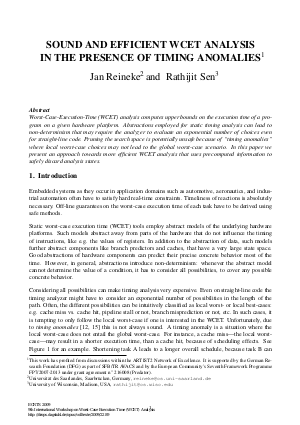Sound and Efficient WCET Analysis in the Presence of Timing Anomalies
Authors Jan Reineke, Rathijit Sen
-
Part of:
Volume:
9th International Workshop on Worst-Case Execution Time Analysis (WCET'09) (WCET 2009)
Part of: Series: Open Access Series in Informatics (OASIcs)
Part of: Conference: Workshop on Worst-Case Execution Time Analysis (WCET) - License:
 Creative Commons Attribution-NonCommercial-NoDerivs 3.0 Unported license
Creative Commons Attribution-NonCommercial-NoDerivs 3.0 Unported license
- Publication Date: 2009-11-26
File

PDF
OASIcs.WCET.2009.2289.pdf
- Filesize: 213 kB
- 11 pages
Document Identifiers
Subject Classification
Keywords
- WCET analysis
- timing anomalies
- domino effect
Metrics
- Access Statistics
-
Total Accesses (updated on a weekly basis)
0Document
0Metadata
Abstract
Worst-Case-Execution-Time (WCET) analysis computes upper bounds on the execution time of a program on a given hardware platform. Abstractions employed for static timing analysis can lead to non-determinism that may require the analyzer to evaluate an exponential number of choices even for straight-line code. Pruning the search space is potentially unsafe because of "timing anomalies" where local worst-case choices may not lead to the global worst-case scenario. In this paper we present an approach towards more efficient WCET analysis that uses precomputed information to safely discard analysis states.
Cite As Get BibTex
Jan Reineke and Rathijit Sen. Sound and Efficient WCET Analysis in the Presence of Timing Anomalies. In 9th International Workshop on Worst-Case Execution Time Analysis (WCET'09). Open Access Series in Informatics (OASIcs), Volume 10, pp. 1-11, Schloss Dagstuhl – Leibniz-Zentrum für Informatik (2009)
https://doi.org/10.4230/OASIcs.WCET.2009.2289
BibTex
@InProceedings{reineke_et_al:OASIcs.WCET.2009.2289,
author = {Reineke, Jan and Sen, Rathijit},
title = {{Sound and Efficient WCET Analysis in the Presence of Timing Anomalies}},
booktitle = {9th International Workshop on Worst-Case Execution Time Analysis (WCET'09)},
pages = {1--11},
series = {Open Access Series in Informatics (OASIcs)},
ISBN = {978-3-939897-14-9},
ISSN = {2190-6807},
year = {2009},
volume = {10},
editor = {Holsti, Niklas},
publisher = {Schloss Dagstuhl -- Leibniz-Zentrum f{\"u}r Informatik},
address = {Dagstuhl, Germany},
URL = {https://drops.dagstuhl.de/entities/document/10.4230/OASIcs.WCET.2009.2289},
URN = {urn:nbn:de:0030-drops-22894},
doi = {10.4230/OASIcs.WCET.2009.2289},
annote = {Keywords: WCET analysis, timing anomalies, domino effect}
}
